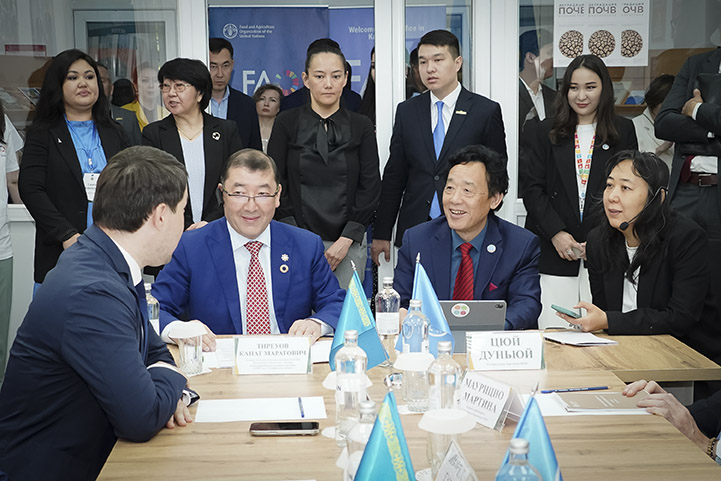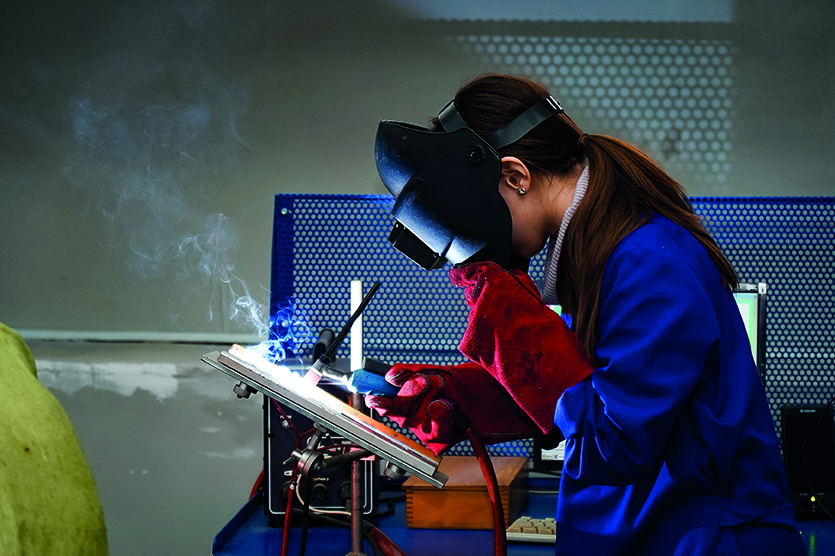
TRANSFORMING SAKEN SEIFULLIN KATRU: FROM A RESEARCH UNIVERSITY TO A WORLD-CLASS INSTITUTION IN AGRICULTURE
Kazakhstan, a country with deep agricultural roots, is rapidly emerging as a major agro-industrial hub. This transformation necessitates the development of a new generation of professionals who are knowledgeable in advanced technologies, scientific innovation, and international standards. Within this context, Saken Seifullin Kazakh Agrotechnical Research University (KATRU, Seifullin University) plays a crucial role in shaping the future of agricultural education, scientific research, and workforce development. The transformation of KATRU aims to elevate it from a research university to a world-class institution.
OCA speaks with Mr. Kanat Tireuov, Doctor of Economics, Professor, Academician of the National Academy of Sciences of the Republic of Kazakhstan, and Chairman of the Board – Rector of KATRU, about the university’s strategic direction, academic transformation, and international ambitions.
OCA: How would you describe Seifullin University in its current state?
Kanat Tireuov: Saken Seifullin Kazakh Agrotechnical Research University, originally established in 1957 as the Akmola Agricultural Institute, is now the leading agricultural university in Kazakhstan. Over the past 68 years, the university has trained more than 100,000 specialists in various sectors of the economy. Today, KATRU is a multidisciplinary institution and plays a crucial role in the modernization of agriculture in Kazakhstan.
OCA: What strategic changes are being implemented to address the challenges of modern education?
KT: We focus on specifically training specialists for each economic sector, especially the agro-industrial complex. Our programs aim to identify promising, in-demand professions by utilizing foresight studies of technologies, equipment, and processes relevant to agriculture.
KATRU offers a total of 142 educational programs across 17 fields of study, which include 56 bachelor’s programs, 52 master’s programs, and 34 doctoral programs. Approximately 33% of these are new initiatives, including joint and double-degree programs developed in collaboration with universities from the Americas, Europe, and Southeast Asia. Additionally, 20% of our teaching staff are foreign scientists, and major employers actively participate in the educational process.
OCA: How does the university rank in international standings?
KT: Thanks to the dedicated efforts of our team, Seifullin University has established a strong position in global rankings. In the 2025 QS World University Rankings, we were placed in the 1201+ category. In the QS Asia Rankings, we rank 281st, and we hold the 16th position in Central Asia. Notably, our reputation among employers has improved significantly, rising by 276 positions, which places us among the top 800 universities worldwide in this category. Our strategic goal is to break into the top 500 universities globally by 2029.

OCA: KATRU holds the status of a research university. Could you describe your research ecosystem?
KT: We have established a robust ecosystem for scientific research and technology commercialisation, particularly in agriculture, food processing, and related industries. Our infrastructure includes modern laboratories, experimental workshops, and production centres. This foundation enables students and researchers to create start-ups and bring scientific advancements to market.
In recent years, our research funding has doubled. A key initiative is the establishment of Kazakhstan’s first agricultural Technopark and engineering centre, which focuses on organic production and processing. This major project will foster scientific collaboration, attract investment, implement research practically, and train a new generation of scientists.
OCA: What steps are being taken to modernise academic processes?
KT: One of our recent innovations is the dual-training model “2.5 + 1.0 + 0.5”. This model allows students to spend a full year in hands-on training at agricultural enterprises, complementing their academic studies. This system benefits both students and employers: graduates are better prepared, and companies can reduce onboarding and training costs.
OCA: What new educational programmes and partnerships have you forged recently?
KT: KATRU is actively updating its educational content to align with international trends. We collaborate with universities from various countries, including the US, Germany, France, Sweden, Canada, Italy, Portugal, China, South Korea and Russia.
One of our new specialisms is “Agricultural Attaché”, a timely and in-demand field in Kazakhstan. We are also launching a programme in “Water Diplomacy” for sustainable water resource management, in collaboration with leading universities in Europe and Asia. Additionally, we are developing a programme focused on “Aquaculture and Aquatic Bioresources” to support the revival of fish farming in the country.
Other innovative programmes we offer include “Agrobiotechnology”, “Modern Landscape Architecture and Urban Environment Design”, and “Agribusiness”. We take particular pride in our international three-level training model. For instance, in the field of crop production, we have:
A bachelor’s programme in “Advanced Agronomic Science”, created in partnership with AgroParisTech (France).
Masters programmes in “Agrobiotechnology” (offered with RUDN, Russia) and “Agronomy” (in partnership with Northwest A&F University, China).
A doctoral programme in “Plant Science,” offered in collaboration with the University of Alberta (Canada).
This model aligns with the President’s initiative to revitalise breeding and seed production, which is crucial for food security, agricultural sustainability, and Kazakhstan’s competitive presence in the global market. Furthermore, we have partnered with the German University of Weihenstephan-Triesdorf to offer a double-degree master’s programme in “Agrarian Management”, preparing specialists for both the Kazakhstani and international agricultural sectors. Graduates will also have the opportunity to pursue doctoral studies in Germany.
OCA: How successful are your graduates in the job market?
KT: Our graduates are highly sought after both in Kazakhstan and internationally. Many secure positions in esteemed institutions such as Parliament, the Presidential Administration, the Government, and global organisations. Others choose to return to their hometowns to develop family farms, where they make a significant impact on local agriculture.
This strong employability stems from our rigorous academic programmes, which are aligned with global standards and developed with input from industry stakeholders. Additionally, we have established strong connections with over 140 major employers and partner organisations.
KATRU’s long-term goal is to rank among the top 500 universities in the QS World University Rankings by 2029. To achieve this, we will invest in research, enhance international cooperation, and modernise education through practical learning and digital technologies. KATRU aims to advance Kazakhstan’s agricultural sector and establish itself as a global centre for agrotechnical research and innovation.
